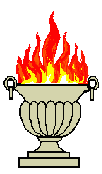
 The prophet Zarathrustra ("Zoroaster" in Greek) Spitama was the son of Pourushaspa Spitama, and lived in Bactria (northeastern Iran) sometime between 1700 and 1500 B.C. The language He spoke (Avestan) was very close to Sanskrit; the language of the ancient Aryans of India. Many scholars consider the Avestans to be Western Aryans, and the writers of the Hindu Vedas to be Eastern Aryans. Zoroaster was, as his father before him, a athaurvan ("priest"). According to tradition, Zoroaster witnessed the pagan Aryans commit many acts of violence and slaughter. He witnessed people selfishly worship the Deavas ("devils"); asking for power, wealth, honor, and other worldly treasures. Becoming discouraged by what he witnessed, he began to search for ultimate truth. At age 30, Zoroaster went into a river to fetch water for a religious ceremony. When he looked back at the bank he saw a shining figure named Vohu Manah; who then brought Zoroaster into the presence of Ahura Mazda("Wise Lord"). The Lord told Zoroaster that he had been chosen to teach mankind asha ("order/righteousness/truth/right conduct/justice/duty/law/Straight Path"...the Avestan equivolent to "dharma"). Zoroaster replied:
Zoroaster taught that there was only One God (plus angels), and that each soul would be judged according to its works (deeds) in the flesh. The Holy Books of the Zoroasterians are the Gathas. The Book of Laws of the Zoroastrians is the Vendidad. The name "Vendidad" comes from the Avestan "Vidaeva-Daza" ("Law Against the Daevas"). A "Daeva" was considered an evil-spirit or an evil-doer. One historian of Zoroastrianism writes: "In ancient times, according to the Vendidad (Vd 15:9-16) abortion was known to be effected by means of certain plants. It was considered murder." (Zoroastrianism and Avesta: Overview and FAQ, p.4 online)The Vendidad is the "Book of Laws" for the Zoroastrian Faith. Here is what it says about abortion: "9. If a man come near unto a damsel, either dependent on the chief of the family or not dependent, either delivered [married] or not delivered, and she conceives by him, let her not, being ashamed [of her adultery or fornication] of the people, produce in herself the menses, against the course of nature, by means of water and plants.That is the LAW OF GOD for the Revelation of Zoroaster.
|

| Abortion and the Baha'i Faith |